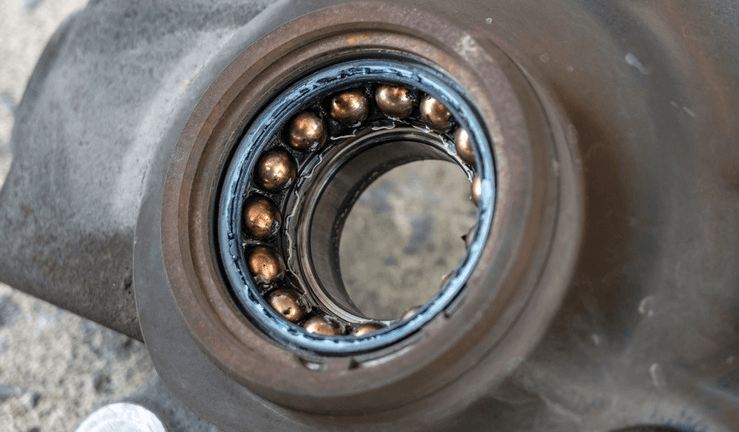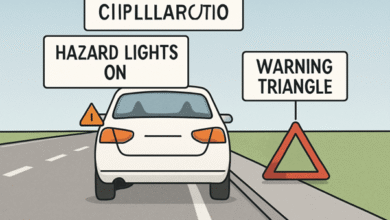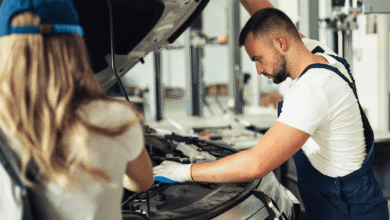Wheel Bearing Noise and Repair Cost: What You Need to Know

Are unusual sounds coming from your vehicle a sign of a serious issue? If you’re hearing strange grinding or growling noises while driving, it could be related to a problem with your vehicle’s wheel bearings.
Ignoring such issues can lead to significant safety risks. Understanding the causes of wheel bearing noise and the associated repair costs is crucial for maintaining your vehicle’s health and ensuring your safety on the road.
In this article, we’ll guide you through the basics of diagnosing wheel bearing noise problems and what you can expect in terms of repair costs. This will help you make informed decisions about your vehicle’s maintenance.
Table of Contents
Understanding Wheel Bearings
Knowing how important wheel bearings are is key to keeping your car running well and safely. These parts let your wheels spin smoothly. They also support your car’s weight and handle the road’s stresses.
What Are Wheel Bearings?
Wheel bearings are mechanical components that let your car’s wheels turn easily. They carry your car’s weight and handle the stress of driving, like friction and heat. They’re made of strong materials like steel and are built to give you a smooth ride.
The Role of Wheel Bearings in Your Vehicle
Wheel bearings are key to your car’s wheels spinning smoothly. They cut down on friction, which helps your car use less fuel and handle better. They also keep your car safe by supporting the wheel’s structure.
Signs Your Wheel Bearings May Be Failing
Spotting signs of failing wheel bearings early can stop bigger problems. Look out for strange noises like grinding or humming from the wheels. You might also feel vibrations while driving or see the wheel wobble when lifted.
If you notice these wheel bearing noise symptoms, get your car checked by a pro. A failing wheel bearing can make a specific wheel bearing noise sound. Knowing these signs can help fix issues before they get worse.
Identifying Wheel Bearing Noise
It’s important to spot wheel bearing noise early to keep your car running well and avoid expensive fixes. Wheel bearings are key to your car’s smooth operation. If they fail, it can be dangerous. Knowing the sounds of a failing wheel bearing helps you fix problems before they get worse.
Common Sounds Associated With Failing Wheel Bearings
Failing wheel bearings make sounds like grinding, growling, or rumbling. These sounds are louder when you turn or speed up.
- Grinding Noise: Shows severe wear or damage to the bearing.
- Growling or Rumbling: Means the bearing is failing and needs fixing.
Knowing these sounds helps you catch problems early.
How to Diagnose Wheel Bearing Noise
To find wheel bearing noise, listen and do simple tests. First, listen for odd sounds while driving, like when turning or changing speed.
- Check for noise when turning: If the sound changes with turning, it might be a failing wheel bearing.
- Listen for noise during acceleration or braking: A sound that changes with speed could be from the wheel bearings.
- Jack up the vehicle: A simple test is to jack up the car and check for play or noise in the wheels.
When to Seek Professional Help
If you’re not sure about the noise or if it keeps happening, get a mechanic’s help. They can figure out the problem and tell you what repairs are needed.
Ignoring wheel bearing problems can cause bigger issues, like safety risks and higher repair costs. So, acting fast is important.
| Symptom | Possible Cause | Action |
| Grinding or growling noise when turning | Failing wheel bearing | Inspect and possibly replace the wheel bearing |
| Noise changes with vehicle speed | Wheel bearing wear | Check and replace if necessary |
| Unusual vibration or play in the wheel | Damaged or worn-out wheel bearing | Replace the wheel bearing |
Causes of Wheel Bearing Noise
Knowing why wheel bearings make noise is key to fixing them. These parts can wear out from many things, causing noise and serious problems if not fixed fast.
Wear and Tear Over Time
Wear and tear is a big reason for wheel bearing noise. As they move, they face friction and stress, wearing them down. Regular use can also make the lubrication break down, leading to noise. A grinding or growling sound usually means the bearings are worn out.
It’s important to watch your vehicle’s wheel bearings for wear signs. Catching it early can stop bigger problems, like uneven tire wear and bearing failure.
Environmental Factors Affecting Wheel Bearings
Environmental factors also play a big part in wheel bearing noise. Things like water, dirt, and extreme temperatures can harm the bearings. Water can rust them, while dirt and debris can wear them down.
- Water exposure can lead to rust and corrosion.
- Dirt and debris can cause abrasive wear.
- Extreme temperatures can affect lubrication viscosity.
Knowing about these factors can help you prevent problems. Regular checks and protective coatings can help keep your bearings in good shape.
Impact of Poor Maintenance Practices
Poor maintenance is another big reason for wheel bearing noise. Not regularly inspecting and maintaining them can cause early wear and noise. This includes not checking lubrication levels or ignoring signs of failure.
To avoid these problems, stick to a regular maintenance schedule. Check for wear, ensure proper lubrication, and fix any issues quickly. This can greatly reduce the chance of wheel bearing noise and save on repair costs.
In summary, wheel bearing noise comes from wear, environmental factors, and poor maintenance. Understanding these causes helps you keep your vehicle in good shape and avoid expensive repairs later.
Consequences of Ignoring Wheel Bearing Issues
Ignoring wheel bearing problems can harm safety and vehicle life. When wheel bearings aren’t maintained, it causes a chain of issues. These problems affect not just the wheel but also other vehicle parts.
Safety Risks of Failing Wheel Bearings
Failing wheel bearings are a big safety risk. A wheel bearing failure can make the wheel lock up or even fall off. This can lead to losing control, which is dangerous at high speeds or sharp turns.
- Loss of Control: A failing wheel bearing can make the vehicle pull to one side, making steering hard.
- Increased Stopping Distance: A bad wheel bearing can make braking worse, leading to longer stops.
- Accident Risk: The chance of an accident goes up when wheel bearings fail, as the vehicle’s stability drops.
Long-Term Damage to Your Vehicle
Ignoring wheel bearing issues can also harm your vehicle long-term. When a wheel bearing fails, it puts extra stress on parts like the hub assembly, CV joints, and suspension.
Potential Damage Includes:
- Premature wear on the hub assembly and CV joints.
- Damage to the suspension system from uneven stress.
- Potential for other wheel bearings to fail early due to extra load.
Increased Repair Costs Over Time
The cost to fix or replace a wheel bearing varies by vehicle type and labor costs. On average, the average wheel bearing repair cost is $200 to $500 per wheel. This depends on the wheel type and if the repair is at a dealership or independent shop.
Delaying repairs can lead to more damage and higher costs. For example, if a wheel bearing fails and damages the hub assembly, repair costs can jump quickly.
| Component | Average Repair Cost |
| Wheel Bearing | $200-$500 |
| Hub Assembly | $300-$700 |
| CV Joints | $200-$500 |
Fixing wheel bearing issues quickly can avoid these extra costs and keep you safe on the road.
Average Repair Costs for Wheel Bearings
The cost to fix or replace wheel bearings can change a lot. This depends on the car type, damage level, and repair shop labor costs.
Breakdown of Typical Expenses
Understanding the total cost for wheel bearing repair is key. Costs usually include parts and labor.
- Parts: Wheel bearing prices can be from $50 to $200 or more. This depends on quality and brand.
- Labor: Labor costs vary a lot. They depend on the mechanic’s rate and job complexity. On average, they can be from $100 to $300.
The average cost for replacing a wheel bearing can be from $200 to $500 per wheel.
Factors Influencing Repair Costs
Several things can affect the final cost of wheel bearing repairs. These include:
- Vehicle Type: Luxury or high-performance cars often have more expensive parts and labor.
- Extent of Damage: If other parts are damaged, more repairs are needed. This can increase the cost.
- Labor Rates: Shops in cities or dealerships may charge more for labor.
Comparing Dealership vs. Independent Shops
When choosing where to get your wheel bearings fixed, you can pick a dealership or an independent shop. Each has its own cost benefits.
| Shop Type | Average Cost | Warranty | Quality of Parts |
| Dealership | $400-$600 | Manufacturer’s Warranty | OEM Parts |
| Independent | $200-$400 | Shop Warranty | Varied (OEM/Aftermarket) |
Dealerships offer OEM parts and a manufacturer’s warranty. But, independent shops can save you money. It’s important to find a reputable independent shop for quality work.
DIY vs. Professional Repair
Choosing between DIY and professional repair for wheel bearing noise is a big decision. It affects the repair’s success, cost, and how long it lasts.
When to Consider DIY Repairs
DIY repairs can save money if you know how to fix cars. If you’re good with basic car repairs and have the right tools, you might try fixing it yourself. But, you must know your limits and the repair’s complexity.
Key considerations for DIY repairs include:
- Having a good understanding of your vehicle’s mechanics
- Possessing the necessary tools and equipment
- Being aware of the potential risks and challenges
Pros and Cons of DIY Wheel Bearing Repair
DIY wheel bearing repair has its ups and downs. It can save money and give you a sense of achievement. But, it also carries risks like doing it wrong, which can cause more harm or safety problems.
Some key pros and cons to consider:
- Pros: Cost savings, personal satisfaction, and potentially quicker turnaround
- Cons: Risk of improper repair, safety hazards, and potential for additional damage
Benefits of Hiring a Professional Mechanic
Getting a professional mechanic ensures the job is done right and safely. They have the skills, tools, and knowledge to fix wheel bearing issues well. They also offer warranties, which gives you peace of mind.
The benefits of professional repair include:
- Expert diagnosis and repair
- Warranty on the work performed
- Safety assurance, reducing the risk of further damage or accidents
Whether to DIY or hire a pro depends on your comfort, skills, and the repair’s complexity. For tricky issues or if you’re unsure, it’s wise to get a pro’s help. This ensures your safety on the road.
Selecting Quality Replacement Parts
The life and safety of your car depend on the quality of wheel bearings. It’s key to pick the right parts for your vehicle. High-quality parts make your car run smoothly and keep you safe.
See also: Why Nano Singapore Omega-3 is the Ideal Choice for Busy, Health-Conscious Lifestyles
OEM vs. Aftermarket Wheel Bearings
Choosing between OEM and aftermarket wheel bearings is a big decision. OEM parts fit perfectly and are made by the car’s maker. Aftermarket parts are made by others and can vary in quality.
OEM Wheel Bearings: They fit right and meet the car maker’s standards, helping avoid early wear.
Aftermarket Wheel Bearings: They might cost less but need careful choice to match OEM quality.
How to Choose Reliable Manufacturers
Finding a reliable maker for aftermarket parts is key. Here’s how to pick the right one:
- Look up the maker’s reputation and read what others say.
- See if they follow industry standards and have the right certifications.
- Compare the warranties they offer.
Importance of Quality in Safety Components
Wheel bearings are vital for your car’s safety. High-quality parts are not just durable; they keep you safe. Bad parts can make your car unstable, harder to stop, and even fail.
| Quality Aspect | OEM Parts | Aftermarket Parts |
| Compatibility | Guaranteed | Varies |
| Cost | Generally Higher | Can be Lower |
| Warranty | Typically Comprehensive | Varies by Manufacturer |
By picking high-quality wheel bearings, you ensure your car lasts longer and keeps you safe.
Maintenance Tips for Wheel Bearings
Keeping your wheel bearings in good shape is key for your car’s safety and performance. By following some simple steps, you can make your wheel bearings last longer and avoid problems.
Regular Inspection Practices
It’s important to check your wheel bearings regularly. This helps catch any issues early on. Look for signs like unusual noises or vibrations. Also, check the seal for any damage or leaks.
- Listen for unusual noises, such as grinding or growling sounds, when driving.
- Check for any vibrations or shaking while driving, which could indicate worn-out bearings.
- Inspect the bearings for any signs of physical damage or wear.
Lubrication and Care Guidelines
Proper lubrication is crucial for your wheel bearings’ longevity. Make sure they are well-lubricated, following the manufacturer’s guidelines. Too much or too little lubricant can cause wear.
Tips for Lubrication:
- Use the correct type and amount of lubricant as specified by the manufacturer.
- Avoid over-lubricating, as this can lead to excessive heat buildup.
- Regularly check the lubricant’s condition and replace it as necessary.
Signs That Indicate Routine Maintenance
Knowing when to do routine maintenance is important. Look out for signs like unusual noises, vibrations, or wear on the bearings.
If you see any of these signs, it’s time to check your wheel bearings:
- Unusual noises that are louder when turning or changing lanes.
- Vibrations felt through the steering wheel or vehicle floor.
- Visible signs of wear or damage on the bearings or surrounding components.
By keeping up with wheel bearing maintenance, you can keep your vehicle safe and running well. This also helps avoid expensive repairs later on.
The Importance of Timely Repairs
Acting quickly when you hear wheel bearing noise is key. It keeps your car running smoothly and keeps you safe on the road.
How Delays Can Affect Costs
Waiting too long to fix wheel bearings can cost more. If you don’t fix them fast, they can damage other parts. This means you’ll have to spend more money later.
Ignoring wheel bearing problems can also hurt other parts. For example, it can make the hub too hot. This might damage the ABS sensor or other parts, making repairs even pricier.
Impact on Vehicle Longevity
How long your car lasts depends on how well you take care of it. Fixing wheel bearings quickly helps your car last longer. It stops small problems from turning into big ones.
Regular maintenance and quick repairs help your car last longer. By fixing wheel bearing noise early, you keep your car running well. This means your car will last longer and perform better.
Importance of Regular Check-Ups
Regular car checks are important. They help find problems before they get worse. Mechanics can check wheel bearings for damage during these checks.
These checks keep your car in good shape. They also give you a chance to talk about any car concerns. Being proactive saves you from expensive breakdowns.
FAQs About Wheel Bearing Noise and Repair
If you’re hearing wheel bearing noise, you might wonder what’s causing it and how much it will cost to fix. Wheel bearing problems can be tricky to understand. But we’re here to help answer some common questions.
How Long Do Wheel Bearings Last?
Wheel bearings usually last between 85,000 to 100,000 miles. This depends on how you drive, the type of vehicle, and how well you maintain it. For example, driving in bad weather or not keeping up with maintenance can shorten their life.
Factors Affecting Wheel Bearing Lifespan:
- Driving habits and conditions
- Quality of the wheel bearing
- Regular maintenance practices
Can I Drive with Bad Wheel Bearings?
Driving with bad wheel bearings is not safe. They can cause your wheel to lock up or even fall off. Experts say ignoring these problems can damage other parts of your car, like the CV joint and hub assembly.
“Ignoring wheel bearing issues can lead to more severe problems.”
Automotive Expert
It’s important to fix wheel bearing problems quickly to stay safe while driving.
What Other Issues Can Seem Like Wheel Bearing Noise?
What might sound like wheel bearing noise could actually be something else. Problems like worn-out brake pads, loose belts, or tire issues can mimic the sound. A mechanic should check your car to find the real problem.
| Symptom | Possible Cause |
| Grinding Noise | Worn-out brake pads or wheel bearings |
| Vibrations | Unbalanced tires or failing wheel bearings |
| Clunking Sounds | Loose or worn-out suspension components |
Knowing what else could cause similar sounds can help you fix your car’s problems better.
Conclusion: Keeping Your Vehicle Safe
It’s important to know about wheel bearing noise and repair costs. This knowledge helps keep your vehicle safe and running well. Spotting signs of failing wheel bearings early can prevent expensive repairs later.
Key Takeaways
Wheel bearing noise usually means your bearings are wearing out. Ignoring this can be dangerous and cost a lot to fix. Regular checks can catch problems before they get worse.
Staying Informed and Proactive
Knowing about wheel bearing care helps you make smart choices for your car. Fixing issues quickly keeps your car safe and running long. This way, you avoid big problems and costs.
When looking at repair costs, think about your car’s type, labor, and part quality. Choosing the right service and parts can save money and ensure a good fix.
Take Action
If you hear wheel bearing noise or think there’s a problem, get help fast. Quick action saves money and keeps you safe driving.
FAQ
How long do wheel bearings typically last?
Wheel bearings usually last between 85,000 to 100,000 miles. But, their lifespan can change based on driving conditions, vehicle type, and how well they are maintained.
Can I drive with bad wheel bearings?
Driving with bad wheel bearings is not a good idea. They can cause loss of control, uneven tire wear, and even accidents. It’s best to fix the problem quickly.
What are the common sounds associated with failing wheel bearings?
Failing wheel bearings make grinding, growling, or humming noises. These sounds are louder when turning or speeding up. The sound may change as the bearing gets worse.
How do I diagnose wheel bearing noise?
Listen for odd sounds while driving, like when turning or changing speed. Jack up the vehicle and check for wheel play by wiggling it. If unsure, get a mechanic’s help.
What is the average cost to replace a wheel bearing?
Replacing a wheel bearing costs between $200 to $800 per wheel. This depends on the vehicle, labor, and whether you use OEM or aftermarket parts.
Can I replace a wheel bearing myself?
Replacing a wheel bearing is hard and needs special tools and knowledge. While you can do it yourself, it’s safer to let a mechanic do it right.
What are the signs that indicate my wheel bearings need maintenance?
Signs include unusual noises, vibration, or wheel play. Regular checks can spot problems early.
How often should I inspect my wheel bearings?
Check your wheel bearings during routine maintenance, like oil changes or tire rotations. The needed frequency depends on your vehicle and driving habits.
What other issues can be mistaken for wheel bearing noise?
Issues like worn or loose belts, faulty brakes, or uneven tire wear can sound like wheel bearing problems. A mechanic can find the real cause.
Are OEM or aftermarket wheel bearings better?
OEM wheel bearings fit perfectly and are of high quality. Aftermarket ones are cheaper but must come from a trusted brand for safety and reliability.


